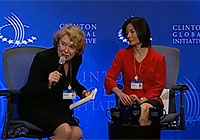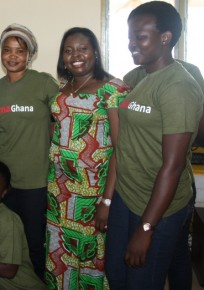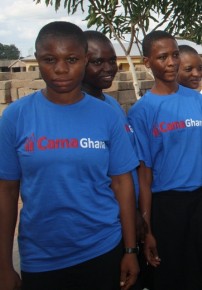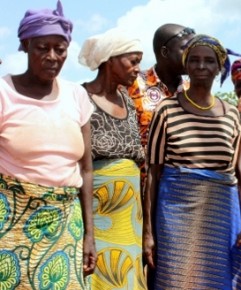
Camfed is a NGO that provides scholarships to keep girls in school. Camfed was founded in 1991 when their founder, Ann Cotton visited Zimbabwe to investigate why girls’ school enrolment in rural areas was so low. Contrary to the common assumption that families weren’t sending girls to school for cultural reasons, Ann discovered poverty was the main roadblock. Families couldn’t afford to buy books or pay school fees for all their children, so they had to choose who would receive an education. Girls were rarely chosen. The reason was simple: boys had a better chance of getting a paid job after graduation. When Ann returned to Cambridge, UK, she became determined to find a way to help girls go to school in Zimbabwe. She recruited friends and family and sold baked goods to raise money and awareness about the lack of education for girls in Africa. At the end of her grassroots campaign, she supported 32 girls through school. In 1993, Ann formally launched Camfed, the Campaign for Female Education. Camfed's model has been so successful that it has been replicated in more than 2,000 communities in Ghana, Malawi, Tanzania, Zambia, and Zimbabwe.
DFID Ghana is supporting Camfed to disburse 20,000 scholarships (see my October 2012 post). I recently met with Dolores Dickson, Camfed Ghana’s country director to understand their approach in more detail.
What are some of the changes you have seen since you joined Camfed Ghana?

Since joining Camfed in 2007, I have seen the tremendous impact we have made on the lives of young women and communities in Ghana, particularly in the Northern part of Ghana. The Northern region has one of the lowest female literacy rates in the country, many of the girls we support come from families where their mothers have never been to school. They are the first generation of girls from their families to go to school. Getting girls from these backgrounds to go to school and to complete is a huge achievement for the girls, their families and communities. I have also seen communities come together, give their time, knowledge and resources (motor bikes, crops and land) to support girls overcome the obstacles that prevented from going to school, such as early marriages, teenage pregnancies and poverty. Chiefs and community elders come together to enact by-laws that aim to prevent early pregnancy; community members come together to support schools with feeding programmes that will keep children in school throughout the school day and community and religious leaders have come together to advocate against child marriage. I have seen change come in individual families because their children have completed school and now have an income to support their parents and other siblings.
What have been some of your challenges?
One of our challenges is the increasing demand for Camfed’s programmes across the country. Camfed’s opportunity to start engagement with communities begins with our bursaries, and we need to find ways to reach these girls. The other challenge is the growing demand for higher education from the graduating girls we support through secondary school.
How do communities, parents and girls feel when they complete secondary school?
There is a sense of excitement, a sense of ‘we have done it’ and pride for parents and community members. For the girls there is a sense of achievement and sometimes a sense of apprehension of ‘what next?’ To this I think most of them feel and see their security in ‘Cama’ (our alumni network) particularly when they get to meet with other Cama members, they begin to gain a ‘can do’ attitude and the hope that we are on course but not there yet and we need to keep doing our best. One young woman remarked after completing school, ‘I am going all out now because I know there are people behind me supporting and cheering me on.’

What is Cama and what are some of the Cama members doing now? Cama is the network of young women who have been supported through school by Camfed. It is a democratic network with strong values such as ‘giving back’, ethical leadership and promotes volunteerism. As a result most of their members are working in ways that bring about change and social impact to their rural communities. For instance, some Cama members have started a radio show that educates their own communities on healthy practices and advice on financial literacy. Cama Ghana members support on average 3 children who are not directly related to them.
What are your hopes for Camfed Ghana?
Under a new partnership with the MasterCard Foundation, we will be able to support academically gifted young women from the Cama network to access tertiary education in some of the best universities in Ghana, growing a cohort of ethical leaders for Africa. Our partnership with Google also offers the opportunity to bridge the digital divide in rural communities by setting up ICT centres which are run and managed by Cama members. These centres provide employment to young women and create opportunities for the rural communities to access market opportunities and gain information on health and education.
Why do you think Camfed Ghana has been so successful in working with communities?
I think Camfed Ghana has been successful working with communities because we invest in our relationships with communities and governments. We also listen and learn.

What do you hope for from the DFID-Camfed partnership?
The DFID-Camfed partnership is supporting 20,000 girls to complete secondary education; this is an unprecedented opportunity and investment in a generation of girls in Ghana. This will bring about significant improvements to lives of many families and communities all over the country. Africa is a growing and youthful continent and this investment could not have come at a better time, the results and impact will be seen in the near future.

1 comment
Comment by Rise and Shine Association posted on
We have been interested, motivated and challenged by Nicole's post. Rise and Shine would like support to to deliver in the communities where it works.